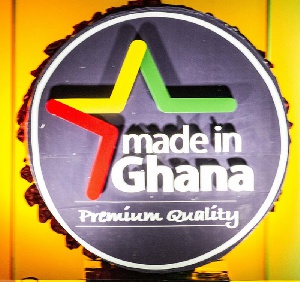- Home - News
- TWI News | TV
- Polls
- Year In Review
- News Archive
- Crime & Punishment
- Politics
- Regional
- Editorial
- Health
- Ghanaians Abroad
- Tabloid
- Africa
- Religion
- Election 2020
- Coronavirus
- News Videos | TV
- Photo Archives
- News Headlines
- Press Release
Opinions of Wednesday, 11 October 2017
Columnist: Doreen Hammond
Choosing Made-in-Ghana patriotism or value for money?
Since time immemorial, the clarion call has been for Ghanaians to patronise made-in-Ghana goods. Day in and day out, we are encouraged to buy made-in-Ghana goods and patronise Ghanaian services through public education, adverts and other forms of media.
The rationale, we are told, is a mark of patriotism as good citizens and proud Ghanaians. Patriotism is being devoted to and showing love for one’s country.
Added to this is the more critical economic reason in terms of the benefits that the country stands to gain through increased and sustained employment generation.
Buying made-in-Ghana goods will also help us strengthen the Ghana cedi against the dollar, and save the much needed foreign exchange. This will result in building a stronger economy for our country.
But what is disturbing is that little effort is made to encourage manufacturers to show some respect to customers, and if nothing at all, meet the minimum quality standards. And so the call is often buy made-in-Ghana goods but little is said about quality made-in-Ghana products.
In a country where quality checks are woefully inadequate and some regulators can be bought for cheap, consumers are always at the receiving end. When it comes to product quality, packaging and branding, our local manufacturers do not encourage us to patronise their goods.
For instance, we buy some plantain chips and it is stapled with pins. The least mistake and it pricks the fingers. It has no label to give us a little detail about what we have used our money to purchase. No idea, when it was made and what the shelve life is?
I bought a pair of made-in-Ghana slipper recently and started limping because one heel was higher than the other. The story of how the fur of a brown puppy was dyed black because people preferred that colour, only for the dog’s true colour to show after its owner walked it in the rain, may be hilarious but the seller would have lost an entire bunch of customers through that singular act of deceit.
Due to this kind of behaviour, Ghanaian palm oil could not be exported to Europe because the Food and Standards Authority there found them to contain Sudan dye, a chemical used in the textile industry, not edible and, therefore, dangerous to health.
Many Ghanaians who became aware of this stopped buying it from the open market. The motive of the traders /manufacturers was that adding the dye made the palm oil attractive in colour!
While we encourage people to buy made-in-Ghana goods there is the need for manufacturers to be educated to maintain their integrity and the trust that customers repose in them by buying their goods. When we buy groundnut paste, we should have groundnut paste and not some concoction of groundnut paste and konkonte (cassava flour)
What our manufacturers should know is that when one customer is dissatisfied with a product and tells others, 100 customers could be lost and so also will a contented customer spread the word and increase the customer base for the manufacturer.
The manufacturer should not only be concerned about profits but also about attracting other customers by meeting some standards and maintaining and increasing their customer base in order to stay in business or even expand.
Some will argue that Ghanaians always prefer foreign goods to locally made ones but I will say Ghanaians prefer quality goods. Of course there are some who would see patronising foreign goods as a status symbol but there are many others who would like to patronise made-in-Ghana goods but would not because of some of the reasons enumerated.
How does one reconcile patriotism with value for money? How does one sacrifice their health on the altar of patriotism? Why should a local seamstress play peek-a-boo with me only because I want to wear a made-in-Ghana dress while a foreign made one stands right next to me on the shelf, ready to reach and at an affordable price?
As long as people work hard to earn money, it behoves local manufacturers to work hard to give them products that would benefit and most importantly satisfy them. Research plays a key role in attaining customer satisfaction.
If the quality of locally made goods is good, we may not have to shout ourselves hoarse to get people to patronise them. In spite of the role advertising has in creating awareness of a product, the old saying that adepa na eton ne ho, literally meaning a quality product sells itself also holds true!











